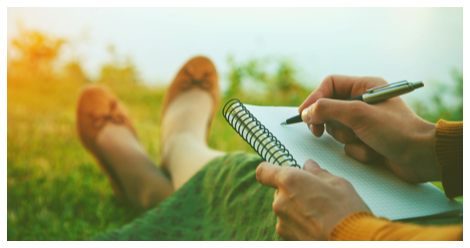
Losing My Identity as A Reader
When I was pregnant, I wrote a post about finding time to read once my son was born. I got really great advice, told myself that babies sleep a lot, and I’ll have plenty of time to work and read. What’s that phrase again? Oh yeah. “The road to hell is paved with good intentions.”
Some babies might sleep a lot; my son is not one of them. During the day, he’ll take a morning nap; an afternoon nap is a rare treat. The first 8 weeks of motherhood were a blur of diaper changes, nursing, outfit changing because of spit-up, nursing more, trying to grab something to eat, late-night wakings, nursing, the rare shower, doctor visits, and more nursing. When he did sleep, for the first 3-4 weeks, it was on me, since he wouldn’t sleep any other way. Once that stopped, when he went down for the night, I would debate whether to write, work, read, eat/shower, or sleep. Reading very rarely won out. I was exhausted, and even if I did sit down with a book, my brain was too worn out to read anything substantial, and my attention span was shot.
But I missed it. Miss it. Because almost 15 weeks into motherhood, my reading is still almost close to non-existent. I’m able to read a book here and there, but it takes much, much longer, and it’s often done at the expense of work or sleep.
My identity, or much of it, has always been built on reading. I’ve always been a reader, since the age of 2. Pictures of me throughout childhood always have a book next to me. I remember going out to dinner with my family, and always bringing a book – I’d read in the car, and at the table, before the food came. My grandmother would take me to the bookstore after school and let me pick out a book or two – usually the latest Babysitters Club book. Since high school, if I was upset or needed to be alone, I would go to a bookstore. Something about wandering the aisles, grabbing a coffee in the cafe and sitting on the floor, reading – it quieted the noise in my head, calmed my anxiety, and was a balm for my soul. My friends and I would go to Borders on a Friday or Saturday night; I’d get a raspberry mocha, and we’d sit for hours in the cafe, each with a stack of books or magazines. I choose purses based on whether or not I can fit a book (or three) in them. My family is always telling me my bag is too heavy. The past few years, during the Goodreads challenge, friends have often commented in disbelief about the volume of books I’m able to read (personal best: 318). I am a nerdy reader, happiest with my nose in a book. I choose books over parties any day, and almost nothing makes my day like a new book does.
Which is why this (hopefully) temporary hiatus from reading so much is disorienting. If I’m not a reader, if I’m not this crazy girl reading a book every day or two, who am I? If reading is my favorite thing, but I rarely get to do it, what does that say? If reading is my form of self-care, but it doesn’t happen often, how does that affect me?
I have stacks of books around my apartment – a stack on my coffee table dealing with child development, raising sons, and sustainable living/parenting; a stack on my kitchen table for my childbirth education training; a stack on a kitchen chair of books on motherhood, some fiction, and several advance copies for reviews and interviews I’m doing; and a stack of magazines on another kitchen chair from the issues I haven’t been able to read since the birth of my son 3 months ago. I am feeling like I will never be able to read again.
If this seems trivial to you, ask yourself this: what have you built your identity around, your life around? I am a writer. Writers, by necessity, read a lot. Now ask yourself what happens when that crucial aspect of you or your life is gone or severely diminished. You have to remodel yourself, reshape your life to the new reality. And that’s hard.













